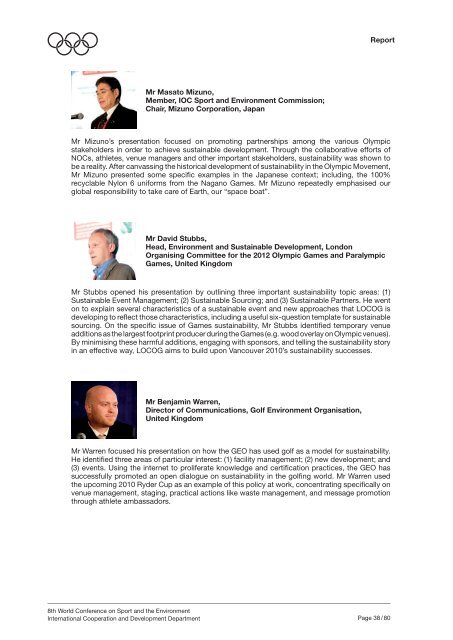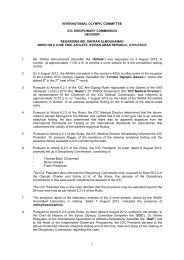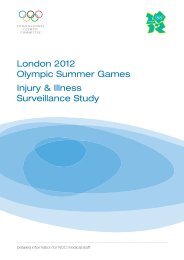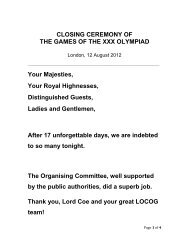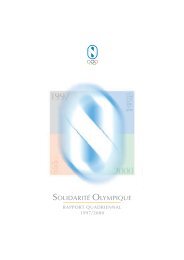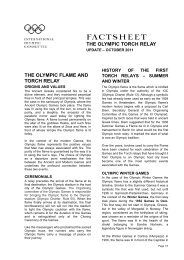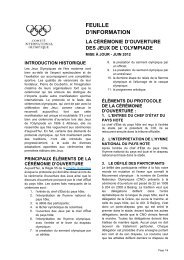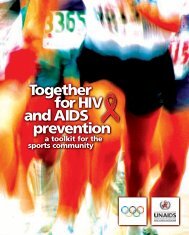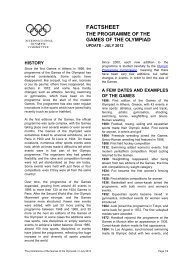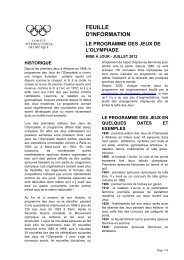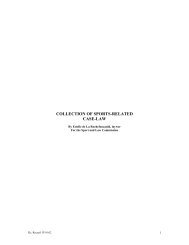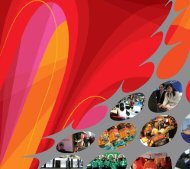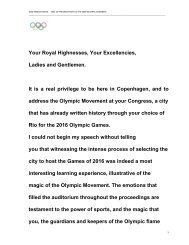8th WORLD CONFERENCE ON SPORT AND THE ENVIRONMENT
8th WORLD CONFERENCE ON SPORT AND THE ENVIRONMENT
8th WORLD CONFERENCE ON SPORT AND THE ENVIRONMENT
Create successful ePaper yourself
Turn your PDF publications into a flip-book with our unique Google optimized e-Paper software.
<strong>8th</strong> World Conference on Sport and the Environment<br />
International Cooperation and Development Department<br />
Mr Masato Mizuno,<br />
Member, IOC Sport and Environment Commission;<br />
Chair, Mizuno Corporation, Japan<br />
Report<br />
Mr Mizuno’s presentation focused on promoting partnerships among the various Olympic<br />
stakeholders in order to achieve sustainable development. Through the collaborative efforts of<br />
NOCs, athletes, venue managers and other important stakeholders, sustainability was shown to<br />
be a reality. After canvassing the historical development of sustainability in the Olympic Movement,<br />
Mr Mizuno presented some specifi c examples in the Japanese context; including, the 100%<br />
recyclable Nylon 6 uniforms from the Nagano Games. Mr Mizuno repeatedly emphasised our<br />
global responsibility to take care of Earth, our “space boat”.<br />
Mr David Stubbs,<br />
Head, Environment and Sustainable Development, London<br />
Organising Committee for the 2012 Olympic Games and Paralympic<br />
Games, United Kingdom<br />
Mr Stubbs opened his presentation by outlining three important sustainability topic areas: (1)<br />
Sustainable Event Management; (2) Sustainable Sourcing; and (3) Sustainable Partners. He went<br />
on to explain several characteristics of a sustainable event and new approaches that LOCOG is<br />
developing to refl ect those characteristics, including a useful six-question template for sustainable<br />
sourcing. On the specifi c issue of Games sustainability, Mr Stubbs identifi ed temporary venue<br />
additions as the largest footprint producer during the Games (e.g. wood overlay on Olympic venues).<br />
By minimising these harmful additions, engaging with sponsors, and telling the sustainability story<br />
in an effective way, LOCOG aims to build upon Vancouver 2010’s sustainability successes.<br />
Mr Benjamin Warren,<br />
Director of Communications, Golf Environment Organisation,<br />
United Kingdom<br />
Mr Warren focused his presentation on how the GEO has used golf as a model for sustainability.<br />
He identifi ed three areas of particular interest: (1) facility management; (2) new development; and<br />
(3) events. Using the internet to proliferate knowledge and certifi cation practices, the GEO has<br />
successfully promoted an open dialogue on sustainability in the golfi ng world. Mr Warren used<br />
the upcoming 2010 Ryder Cup as an example of this policy at work, concentrating specifi cally on<br />
venue management, staging, practical actions like waste management, and message promotion<br />
through athlete ambassadors.<br />
Page 38 / 80


